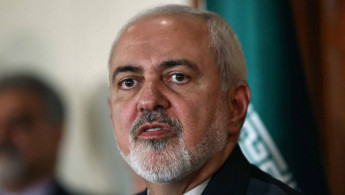Iran warns Trump against 'illusion' of short war
Iran's foreign minister on Thursday warned US President Donald Trump he was mistaken to think a war between their countries would be short, as Washington sought NATO's help to build an anti-Tehran coalition.
The latest developments in the Iran-US standoff came as a diplomatic source in Vienna said Tehran would not exceed a uranium stockpile limit agreed with world powers, contrary to what it had said earlier this month.
Iran had said it expected to surpass on Thursday the agreed 300-kilogram (660-pound) maximum reserve of enriched uranium because it no longer felt bound by certain limits contained in the 2015 deal, which the United States unilaterally pulled out of in May 2018.
"They won't exceed it today," the diplomatic source, speaking on condition of anonymity, told AFP in Vienna on the eve of a meeting by a commission that oversees the nuclear deal.
The source suggested there might be a "political reason" for this, given intensified efforts by European governments in recent days to de-escalate tensions in the Gulf region.
But an Iranian official who also spoke on condition of anonymity said the limit had not yet been breached for "technical" reasons, pointing out that Thursday and Friday are the weekend in Iran.
The tensions, sparked by Trump's withdrawal from the nuclear deal, were exacerbated earlier this month when Iran shot down a US spy drone over the strategic Gulf after a series of tanker attacks that Washington blamed Tehran for despite its denials.
Since then the arch-foes have been locked in a war of words, which escalated this week when Trump announced new sanctions against Iran's supreme leader Ali Khamenei and top diplomat Mohammad Javad Zarif.
- 'Short war is illusion' -
"'Short war' with Iran is an illusion," Zarif wrote on Twitter a day after Trump said he does not want a war with Iran but warned that if fighting did break out, it "wouldn't last very long".
The Iranian foreign minister added: "Whoever begins war will not be the one ending it."
On Wednesday, Trump hinted that any conflict would be waged with air strikes, saying there would be no US boots on the ground.
In an interview on Fox Business Network, Trump was asked if America was going to go to war with Iran.
"Well, I hope we don't but we're in a very strong position if something should happen. We're in a very strong position," Trump said.
"It wouldn't last very long, I can tell you that. And I'm not talking boots on the ground."
His remarks came after Iranian President Hassan Rouhani tried to rein in the crisis between the two sides, saying that Tehran "never seeks war" with Washington.
The US envoy for Iran, Brian Hook, said Thursday there would be no let up for the Islamic republic.
"We will continue to increase our pressure on Iran until it's behaves like a normal regime and comes back to the negotiating table," he said in Paris.
But as the tensions remained high, the acting US defence chief pressed NATO allies to join Washington's efforts to squeeze Iran and ensure the safety of ships in the Gulf after the tanker attacks.
Mark Esper urged allies to "consider public statements condemning Iran's bad behaviour and making the point that we need to have freedom of navigation in the Strait of Hormuz".
He also sought to "internationalise" the Iran issue, at a meeting of NATO defence ministers in Brussels devoted to discussing the Iran-US crisis.
- 'Maximum pressure' -
Many European countries have been alarmed at the Trump administration's hawkish approach to Iran, fearing the US policy of "maximum pressure" is counterproductive and could lead to war.
Any NATO involvement in the Gulf would need unanimous support from all 29 member states, and given European unease this would be extremely difficult to achieve.
"We would like to see more calm from the two actors but we really don't want this to become a NATO issue," said a diplomat from the alliance in Brussels.
Under the landmark deal with world powers in 2015, Iran pledged to reduce its nuclear capacities for several years and to allow inspectors into the country to monitor its activities in return for relief from international sanctions.
The deal set a limit on the number of uranium-enriching centrifuges, and restricted Iran's right to enrich uranium to no higher than 3.67 percent, well below weapons-grade levels of about 90 percent.
But after being hit by waves of crippling UN sanctions, the Islamic republic said in May it would gradually step away from its commitments.
Tehran has also threatened to start enriching uranium above the agreed purification level of 3.67 percent starting from July 7.





 Follow the Middle East's top stories in English at The New Arab on Google News
Follow the Middle East's top stories in English at The New Arab on Google News
![The UAE is widely suspected of arming the RSF militia [Getty]](/sites/default/files/styles/image_330x185/public/2024-11/GettyImages-472529908.jpg?h=69f2b9d0&itok=Yauw3YTG)
![Netanyahu furiously denounced the ICC [Getty]](/sites/default/files/styles/image_330x185/public/2024-11/GettyImages-2169352575.jpg?h=199d8c1f&itok=-vRiruf5)
![Both Hamas and the Palestinian Authority welcomed the ICC arrest warrants [Getty]](/sites/default/files/styles/image_330x185/public/2024-11/GettyImages-2178351173.jpg?h=199d8c1f&itok=TV858iVg)